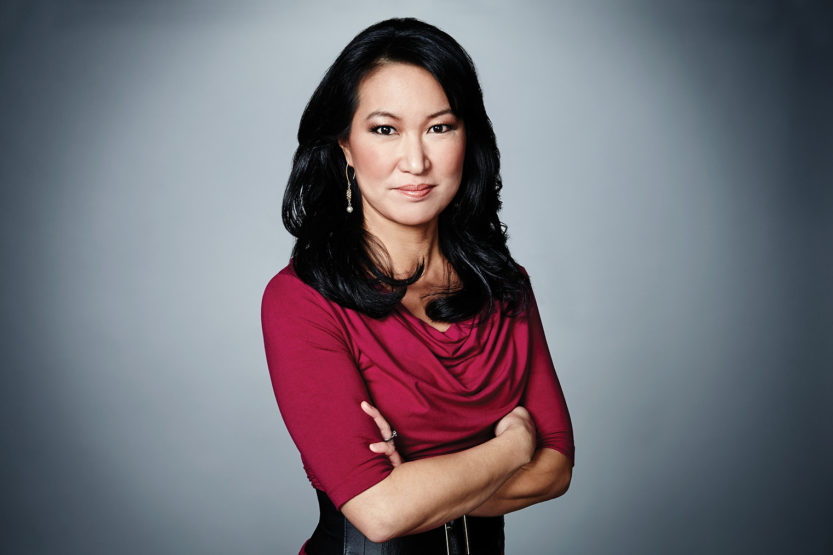Alumni Interview: Kyung Lah
 “The biggest story, in terms of its impact and of what it required of me, was the earthquake and tsunami that struck Japan in March 2011,” says Kyung Lah, ’93 MEDIA, a CNN national correspondent. (Image by Jeremy Freeman)
“The biggest story, in terms of its impact and of what it required of me, was the earthquake and tsunami that struck Japan in March 2011,” says Kyung Lah, ’93 MEDIA, a CNN national correspondent. (Image by Jeremy Freeman) When I was about 5 years old, my parents emigrated to the U.S., ending up in Streamwood, Ill., where they ran a convenience store. I saw a lot of injustice growing up; my parents were very intelligent people, both with master’s degrees. But their language skills were poor, and this held them back.
We were acutely aware of being outsiders. One of my parents’ main goals was for me to fit in. We stopped speaking Korean in our home so that I would learn how to speak English without an accent. I’m very conscious of the sacrifices they made for me.
I majored in communications, with an emphasis on print journalism. In my freshman year, I worked on the Daily Illini, where I learned, first and foremost, that my writing sucked. I worked very hard to improve it. I also joined the speech team, an experience that taught me how to present information efficiently.
I had several undergraduate internships at radio and television stations, which gave me an excellent portfolio of experiences. One internship was at WBBM in Chicago. When I left, they said, “Call us when you graduate.” Well, the day after I graduated, I started there. Not long after, I landed my first big investigative story. I was reading a Korean language newspaper when I saw ads that had been placed by a doctor working in a beauty salon. He said he could perform plastic surgery on Korean people who wanted to look more European. I went undercover with a hidden camera, and I got him on tape explaining how he would create an eye fold that would resemble a double eyelid. Thanks to my report, he was arrested for performing medicine in a beauty salon.
You’d file your story, go back, sleep a little bit, wash your face, splash some water under your armpits, and then get back out there.
Jobs at many other stations followed: Kalamazoo Mich., San Diego, Los Angeles, and finally, after more than a decade, a job with CNN, assigned first to Washington, D.C., then Tokyo.
When I was offered the Tokyo assignment, I hesitated. I didn’t know if I wanted to live in Asia. I had spent so much of my life struggling to blend in—I wasn’t sure if I wanted to replicate that experience, but in reverse. My husband, Michael Tuggle, who had been ABC’s Baghdad bureau chief, pushed me. “You gotta go!” he said.
The experience helped me understand myself. Wherever I went—Korea, Japan, China—the people defined me as American. They saw how I walked, talked, conducted myself and knew I was American. The move also helped me understand my parents better.
Under the CNN system, a correspondent can be assigned to a story anywhere. I have covered a lot of dramatic stories, including the school shooting in Newtown, Conn.; the disappearance of Malaysia Airlines Flight 370 over the Pacific; and the crash of Malaysia Airlines Flight 17 in the Ukraine.
The biggest story, in terms of its impact and what it required of me, was the earthquake and tsunami that struck Japan in March 2011. Living through a 9.0 earthquake was unbelievably frightening—and the subsequent tsunami was devastating. It felt like Japan was going to fall into the ocean. I was pregnant at the time, living in Tokyo with my husband and my 18-month-old daughter. CNN told me to evacuate. I thought that was ridiculous. If I abandoned the assignment, I would never be taken seriously again.
It was a harrowing experience. Japan is a highly advanced nation, and people underestimate how much was destroyed. In the immediate aftermath, we focused our coverage on the impacted areas, where there was no water, food or electricity. More than 15,000 people were killed, thousands of them children. There was no place to stay in the zone, so we had to drive back and forth several hours each day. You’d file your story, go back, sleep a little bit, wash your face, splash some water under your armpits, and then get back out there.
I have no aspirations to be an anchor. It’s fun, but I love telling the story. I don’t kid myself—I’m very lucky, and I don’t take that for granted.

